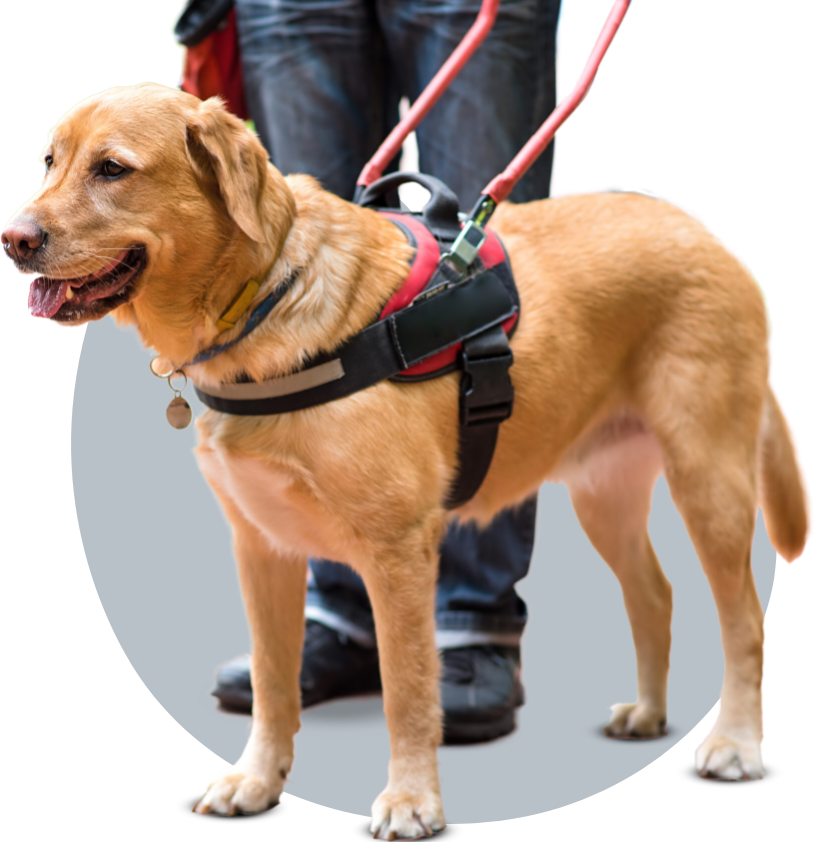Rules Differ for Service Animals Vs. Emotional Support Animals – Here’s How

Many people feel overwhelmed and confused about the rules governing service dogs and Emotional Support Animals.
This is worrying because it means people who are already living with disabilities sometimes are not taking advantage of all the privileges they are entitled to and that will make their lives easier.
Even worse, it also means that people get put off registering their pets in the first place and struggle on without their support needlessly.
If you find the rules confusing, know you are not alone. Read on for an outline of the law, and if you need any further help, advice, or support – contact us.
We’ve been helping people with service animals and Emotional Support Animals for over 25 years. It’s our job to keep up with changes in the law and find solutions to help our clients. We’d love to help you too!
What’s the Difference Between a Service Animal and an Emotional Support Animal?
Service Animals
A service animal is usually a dog (or sometimes a miniature horse) who is trained to carry out specific tasks for someone who is physically or psychiatrically impaired. Service animals are also known as assistance animals, assist animals, support animals, or helper animals depending on the tasks the animal is trained to carry out and the country.
In order to qualify for a service dog, you must have difficulty performing at least one major life activity without assistance. Although you don’t need a letter from a doctor to qualify for a service animal, if you are legally challenged you will have to provide documentation that provides proof of your disability.
For more information about who qualifies for a service dog and how to register, visit our Service Dog Registration Page here.
Emotional Support Animals
In contrast, an Emotional Support Animal doesn’t carry out specific tasks for their human companion, but they help people with emotional or mental health conditions stay calm in a situation that might otherwise be triggering for them.
In order to qualify for an Emotional Support Animal, they must have been prescribed by a licensed therapist, psychiatrist, or psychologist, which means they become part of your treatment plan. Although it’s not a legal requirement to register your Emotional Support Animal, doing so legitimizes your animal and means you have less trouble and less explaining to do when you need to take them into places where they are not usually allowed.
For more information about qualifying for and how to register an Emotional Support Animal visit our registration page here.
Housing Rights for People With Service Animals and Emotional Support Animals

According to The Fair Housing Amendments Act of 1988, landlords and property managers are required to allow a service animal or Emotional Support Animal to live with their owner even in properties where pets are otherwise not allowed and they cannot charge you an additional fee.
This means if they have a “cats only” policy, and your service animal or Emotional Support Animal is a dog, they must allow them to live with you. They are also not allowed to discriminate about animals of a certain size or breed.
Click through for detailed information about the rules governing housing and service dogs or Emotional Support Animals.
Flying with Your Service Animal and Emotional Support Animal
According to the Air Carrier Access Act, airlines must allow you to fly with your service animal or Emotional Support Animal in the cabin with you and they may not charge you an extra fee.
If you have a service animal, you do not legally need to provide documentation, although you do need to be able to explain to airline staff which tasks your service dog assists you with. Although you’re not legally obliged to, airlines ask that your service animal wears identifying patches or a vest, a service leash, and an ID card from a creditable agency like the National Service Animal Registry.
For more information about flying with your service dog, read our guide.

The rules are slightly different for an Emotional Support Animal.
Although airlines must allow you to fly with your service animal in the cabin and must not charge you an extra fee, you do need to provide documentation. You must have a letter from a licensed therapist, psychologist or psychiatrist and some airlines will also require your therapist, or physician to fill in a form. We can help you get all the documentation you need, click here for more information.
Like with service dogs, owners of Emotional Support Animals are advised to get service patches, a vest, a service leash, and an ID card for their animal before they fly. Although you are not obliged to do this legally, it is a requirement for most airlines and will mean you encounter fewer problems when traveling with your Emotional Support Animal.
For detailed information about flying with your Emotional Support Animal, read our guide.
Taking Your Service Animal Or Emotional Support Animals Into Public Places
According to the Americans With Disabilities Act (ADA) people with service dogs must be allowed into places of public accommodation, which is pretty much any business open to the public except private clubs and places of worship.
This means you can take your service dog along to restaurants and bars, movie theaters and libraries, shops, schools, gyms and hospitals.
For more details about public places where you can legally take your service dog, please read our guide.
The rules are different for people with Emotional Support Animals. There is currently no legal requirement for places of public accommodation to allow you to bring along your ESA.
You may find, however, that having a fully registered ESA with an ID card and identifying patches, vest, and service leash means staff in public places are more likely to let your ESA accompany you.
Click here for more detailed information about your legal rights for your Emotional Support Animal.
Different Rules For Service Dogs and Emotional Support Animals
The rules do vary slightly between service animals and ESAs, but remember, we’re always here to offer you help, support, and advice. If you need any further information about these or any other issues about service and Emotional Support Animals, please contact us.














































































